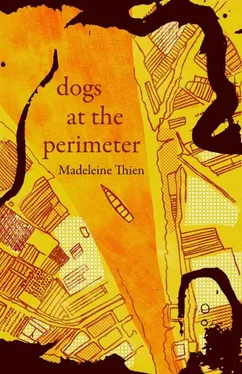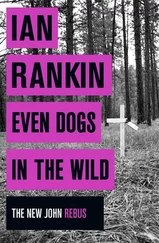A woman stood in the shade, her blouse dark with sweat. She told us that all the hospitals had been emptied, the injured and dying had been thrown into the street wearing their hospital gowns, holding their own iv bags. Government soldiers had been shot on the road, students and teachers were being trucked away.
“They told us not to pack very much,” my father said sternly. “We’ll come home in a day or two.”
The woman’s long hair had fallen loose and it clung to her neck. “They told me, ‘Go back to your home village.’ Well, mine is up past Battambang, that’s three hundred kilometres away, and I haven’t been there since I was a girl. Getting there will take more than a few days, won’t it? And then what?”
My mother was standing in the doorway now. “He’s gone,” she said. “The doors are all broken. He’s already gone.”
We stood together, waiting in front of the house. A group of Khmer Rouge came and told us to get out of here, to move on.
The woman wandered off, scratching madly at her arms. “Watch your step,” she said. “Don’t fall into the holes.”
Back on the main road, the crowd trudged slowly, as if through mud. A voice, amplified by loudspeakers, prodded us north, then west.
Beside me, a man with no legs crawled forward on his elbows. My mother was crying noiselessly. I stared at the ground and then up at the sky, where the elegant buildings seemed to wilt in the heat. I saw white shutters, cars turned on their sides, crates of chickens, howling dogs, and, in every direction, a shifting wall of people. On my left, two Khmer Rouge were guarding an intersection. I wanted to see them, I tried to get nearer.
A woman was arguing with them. She wanted to take another road but they were refusing to let her pass. She persisted. “My husband and children were sent down Route 2,” she said. “If I hurry, I’ll be able to join them.” She put her hands together, bowed her head, touched her fingertips to her forehead in a sign of respect. Casually, one of the boys lifted his rifle and shot her. She was thrown backwards, her skull cracking against the pavement. Blood poured from her heart as if it would never stop. Within seconds, the boys had unclasped her watch, taken her necklace and her ring, and then rolled the body to the edge of the road. The woman’s hands still moved, her lips were speaking. One of the boys met my stare. “What are you looking at?” he said. He prodded the woman with his foot. “Does this belong to you?”
My father spoke my name, he pulled me away into the thicket of bodies.
My father disappeared. But still, even now, I imagine seeing him again. In my dreams, he tells me that time ran away from him. Time, only time. One day he blinked his eyes and thirty years had come and gone. Just last night, my father had knocked at my door, surprised and embarrassed, asking me where everyone had disappeared to, demanding to know why we hadn’t waited and why, all these years, we had never answered his calling.
“You didn’t have time to speak,” I said.
“Didn’t I?”
“On that day, it happened so quickly.”
“I had a list of things to tell you,” he said. There was snow in his hair, crystals on his eyelashes. “I had a list of things to tell little Sopham. Where is my boy? Where is Mother?” He stared at me, as if seeing me for the first time. “Why are you all alone here?”
Three days after we had begun walking, we reached a checkpoint. The men were separated and questioned one by one. Afterwards, my father was guided, alongside dozens of others, into a waiting truck, the soldiers pushing him into the vehicle as if he were a child. We lost sight of him but I heard him saying our names, my father’s thin voice rising out of the press of bodies.
“Are you afraid of us?” one soldier asked, circling the truck. “Why in the world are you afraid, my brothers? When did we ever betray you?”
“Let me down,” an old man said. “Please. I can’t breathe. There’s no air in here.”
A boy aimed his AK at the truck and told the man to be still. He called him mit , my friend, comrade, he said that the men in the truck were the lucky ones. They were going into the forest to study, they were educated men who would one day serve the country and Angkar.
“But what is Angkar?” the old man asked.
The boy looked at him, incredulous. “Angkar fought this war and won your freedom. Don’t you know?” He kept talking about Angkar, which meant the “organization,” and Angkar Leu, the “Greater Organization.” I understood the boy’s words but I couldn’t follow their meaning, it was as if another vocabulary, another history, had distorted the language I knew.
My mother went from one soldier to another, pleading with them to release my father. “Please,” she said desperately. “Let him stay with us.” Her hands were clasped together.
A soldier pushed her hands down. “Don’t beg,” he said. “Don’t demean yourself. Everyone is equal now.”
Sweat ran down my neck, down my back, it shone on the faces of the men as they bowed their heads against the sun. I heard my name spoken again and again, my father’s voice calling as if he wanted me to join him, or flee, or hold on. The Khmer Rouge watched us with such derision, such contempt, I couldn’t move, my limbs were frozen but things around me seemed to move faster, to grow tumultuous. Our religion was Buddhism and it taught us that life was suffering and that the cycle was eternal and would continue no matter our individual destinies. For the first time in my life, I saw the cycle, I saw its end, a lake, a nothingness on which we hovered.
The engine started and the truck pulled away. The soldiers watched until the men had disappeared, and then they lowered their guns.
My mother held us. She spoke into my brother’s hair, “It’s the dust, it’s the dust, my darling. Who will help us? All I can see is dust.”
The soldiers sent us south then east, then north again. Every night, we slept in the open, surrounded by hundreds of people until, bit by bit, the city people were gradually dispersed. There was a mountain, I remember, Phnom Chisor, that we skirted and climbed and descended, it was always there, growing larger or receding behind us. The farther we walked, the more silent the world became, stripped of traffic, blaring radios, air raid sirens, voices. Each morning, I woke believing my father had returned, but it was always my brother, prodding me awake, his eyes wide and alarmed. I saw purple skies, Martian seas against the saffron temples. I saw my mother trying to make a meal from the things we had scavenged. After weeks of walking, we were ordered to turn around, we were sent east across the river, into Prey Veng province.
My brother asked me if this wandering would last forever. Maybe the cities are truly gone, I said, and they have no place to send us. Gone how? he asked. Bombs, I said, but we had seen no airplanes, no fighters in the sky. He knew it, too, but didn’t say so.
The rainy season began. Somewhere near to Wat Chroy, a man met us on the road. By then, we were a group of sixty or seventy people. The man, who said his name was Kosal, had eyes that seemed to droop at the edges, as if his face could be nothing but sad. He said he was the Angkar here and that this cooperative was our destination. We looked around: we were standing in a fallow field, at the edge of a tattered village.
“What do you mean?” someone asked. “Our homes are in Phnom Penh.”
“Your homes are here,” Kosal said, smiling kindly. “Angkar wants you to remain with us.”
“But our belongings —”
Kosal nodded. “Tomorrow we’ll think about the rest. At oy té . You have nothing to fear.”
Staying near to one another, we made our camp for the night.
Читать дальше












